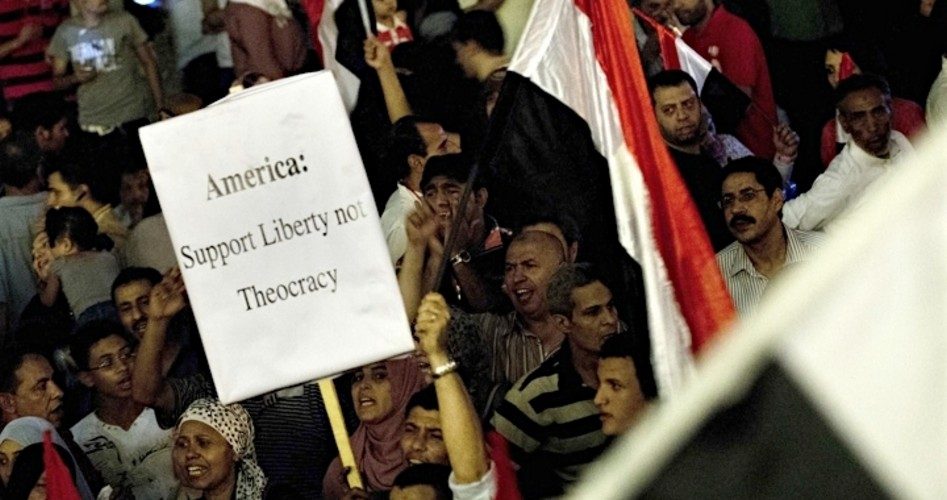
Secretary of State Hillary Clinton’s motorcade faced a barrage of tomatoes, shoes, and protesters in her visit to Cairo, Egypt, July 16. Some Egyptian protesters charged that the U.S. government had supported the Muslim Brotherhood in the Islamic nation’s recent presidential election, though it’s unclear if the Obama administration did provide support for any party.
Clinton traveled to Egypt with a Santa Claus-sized sack of gifts for the ruling government, including the Obama administration’s commitment to “relieve up to one billion dollars in Egypt’s debt” and a new $60-million “U.S.-Egypt Enterprise Fund.” Clinton also promised the Obama administration was “ready to make available $250 million in loan guarantees to Egyptian small-and-medium-sized businesses.”
But it’s unclear whether the elected leaders — President Mursi and the Parliament — or the military are the “government” leaders who will enjoy the U.S. taxpayer largesse. Mursi was the Islamic-allied Muslim Brotherhood’s presidential nominee, and the Egyptian parliament — abolished by the military in February — is dominated by a coalition of parties allied to the Muslim Brotherhood and even more fundamentalist Salafist parties. Before the elections, the military — which held sway under the Mubarak and previous Egyptian governments — reserved many government powers to itself.
The Muslim Brotherhood is an Islamic party known in Egypt as a charitable organization, but one which has a history in Egypt of violently opposing government dictators. The Brotherhood was actively courted by both the Soviet KGB and the U.S. CIA in the 1950s and 1960s, though it’s unclear if either holds any sway over the party in Egypt at this time.
Clinton’s message in Cairo expressed a willingness to work with the government, implying she wanted more power for the elected leaders and less for the military. “I have come to Cairo to reaffirm the strong support of the United States for the Egyptian people and for your democratic transition,” Clinton said, adding she had engaged in “constructive dialogue” about “how the United States and Egypt can work together in a spirit of mutual respect and mutual interests.”
Clinton and the Obama administration were late-comers in backing Egyptian popular elections, expressing repeated support for the Mubarak dictatorship over the years. In November 10, 2010, just five weeks before the Arab Spring uprising began in Tunisia, Clinton said of the Mubarak regime: “The partnership between the United States and Egypt is a cornerstone of stability and security in the Middle East and beyond, and we look to Egypt for regional and global leadership on a wide range of issues. This is a relationship rooted in mutual respect and common interests and a history of cooperation and a shared vision for the future. …in particular, I wish to commend the personal commitment of President Mubarak.”
Even after the “Arab Spring” came to Egypt in January 2011, Hillary Clinton was still claiming, “We want to continue to partner with the Egyptian government and the Egyptian people.”
Likewise, President Obama said in a January 26, 2011 YouTube interview that Mubarak had been “an ally of ours on a lot of critical issues,” and that “President Mubarak has been very helpful on a range of tough issues in the Middle East.” Obama made these remarks even as protesters were demanding an end to the Mubarak dictatorship and were being beaten and doused with tear gas canisters marked “Made in America.”
The Obama administration was clearly taken by surprise on the issue of the Arab Spring in general, and of Egypt in particular. Even as late as February 1, 2011, after it became more than clear that Mubarak was on the way out, President Obama said little of substance in a national address on Egypt. Obama focused his remarks toward describing how he had discussed with Egyptian dictator Mubarak how Egypt is a “long-time partner of the United States” and pleaded for non-violence by both the military and the protesters.
When the post-uprising Egyptian elections resulted in the election of Islamic-oriented parties, the Obama administration apparently adopted the course of trying to leverage its influence over the military as a means of moderating the Muslim Brotherhood’s agenda. Egypt’s majority Muslim leaders have imposed many pogroms against Copts — an orthodox sect of Christianity — over the centuries, and those attacks have continued in recent years. But Islam’s original prophet Muhammad pledged tolerance to Christians in Egypt’s Sinai and Yemen’s Najran, and in his life lived by the pledge (though his successors did not). President Mursi has followed a policy of tolerance thus far, pledging safety for Egypt’s Coptic Christians and appointing a woman and a Coptic Christian as vice presidents.
Photo: People hold signs as they protest the visit of U.S. Secretary of State Hillary Clinton outside the Four Season Hotel, July 14, 2012, in Cairo, Egypt: AP Images



